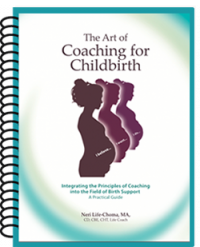
Matrescence: Identity-Shifting Transformation
Matrescence (pronounced ma tres ens) refers to a transformative period of identity-shifting experienced by a woman during her transition into motherhood. “The psychological birth of a mother, similar to adolescence, involves hormonal and identity shifting.”
The definition of Transformation is simple: a change from which there is no going back. This simplicity is the origin of the Transformational birth support coaching approach, which invites doulas and all other birth workers to gain transformative power and integrate it into their practice.
There is no going back from becoming a parent. It means transforming from being someone’s child to someone’s parent.
Becoming the designated adult accountable for someone else’s life. For birth givers, it means transforming from someone who has been given life to someone who is giving life, which involves a physical transformation of the body, which is well described by the term “Matrescence.”
Drawing attention to the transformative nature of childbirth
Since the mid-70s, researchers have been calling attention to the becoming of a mother. One of them is anthropologist Dana Raphael, who coined the term Matrescence. More recently, Dr. Alexandra Sacks, a reproductive psychiatrist, has centered her work around making matrescence a well-known word as adolescence. According to Dr. Sacks, both Matrescence and Adolescence are :
- Hormone dominant
- Body-altering
- Irreversible
- A rite-of-passage
- Confidence- challenging, and…
- Awkward
I wanted to gain transformative power to positively impact my clients’ lives, ensuring they undergo this identity-shifting transformation with a positive mindset and find their power instead of losing it
Additionally, becoming a mother or parent significantly changes our social status, unlike during adolescence. By coining the term Matrescence, the researchers aimed to draw our attention to the deep transformation that occurs during pregnancy and becoming a parent, inviting our society and culture to recognize this transformation in all aspects, including the connection between mind and body.
Women not only studied the transformation but also wrote poetry about it. Sophia Stid is a Californian poet who wrote a poem called ‘Matrescece,’ describing the experience of a modern woman while birthing:
Become a mother, become room, become food,
become miracle. The heart of each devours
the other’s heart. Hurry – become faster, Barely
made myself, I knew what they said meant
my body was a door, made for someone else
to come through. Become sacrament.
The commandments I kept, the ones
I couldn’t keep – all practice before
this one. Become sacrosanct. In birth, the pain
is not like other pain. In birth the pain is purpose-
ful and anticipatory. Anticipate. Become vanishing
act. Become numb, shaved, cut, split, crazy with pain-
become bare beneath the wide washed
lights of medicine and angels – become everything
and so nothing, and no one, but a mother, a
miracle room, a heart in someone else’s mouth
Listen to my interview with Maureen McGrath in which we discuss the concept of Matrescence
Did you need a moment to catch your breath? I needed one. Reading this poem shook me to the core. I felt a deep sense of loss instead of gain. the loss of power and self-authority. The loss of control over one’s body. It made me deeply sad. I became a doula with a different perspective on childbirth, believing it to be the most spiritual, sacred, and empowering experience in birth givers’ lives. An experience of growth and gain. Most clients I’ve supported hired me to have a positive and healthy experience, and I thought they shared my perspective. Could it be that their perspective was so much different than mine?
Hidden beliefs when undergoing Matrescence
I had been a doula for over a decade when I came across the term, and this poem tapped into my conviction that I must gain transformative power to impact our clients’ lives positively. I must ensure they undergo this identity-shifting transformation with a positive mindset and find their power instead of losing it. I realized that expectant individuals’ beliefs can be so different than what they say they want. The loss of inner authority might even result from so many medical exams, tests, and checkup appointments with medical caregivers throughout the process of Matrescence: 13 doctors’ appointments during a low-risk pregnancy, 3 urine tests, 4-5 blood tests, 4 ultrasound tests, 2-3 vaginal exams/swabs, and 2 monitors exams, and not even one conversation about one’s identity shift! This can explain the hidden beliefs of fear, loss, and lacking self-authority, even when informed and educated. I realized I never invested the time to reveal their beliefs and address their mindset, which might explain why their choices and actions sometimes didn’t align with what they wanted. And I am wholeheartedly committed to changing it.
13 doctors’ appointments during a low-risk pregnancy, 3 urine tests, 4-5 blood tests, 4 ultrasound tests, 2-3 vaginal exams/swabs, and 2 monitors exams, and not even one conversation about one’s identity shift!
What is a transformative power?
Having transformative power means you can change someone’s life by means of:
- Raising awareness of one’s belief system, perspectives, needs, challenges, and strengths.
- Impacting one’s decision-making process and choices to help them rethink and revisit their world model so they can rewrite their reality
- Empower people to engage in actions that are new to them and can help them achieve the transformation they undergo.
Transformational coaches are leaders who help clients undergoing identity-shifting transformation gain self-awareness and rewrite their lives by helping them connect with their inner authority and be empowered to complete the transformation and become who they can be. I knew for a long time that my doula support was physical, emotional, and informational, but wasn’t transformative. I knew I wanted to gain the strategies to lead this type of transformational support.
Scehdule your free consultation to learn more about gainning your birth worker transformative power
If you’re a doula who has been struggling like me to understand the gap between clients’ wishes and their behavior – the choices they make and their actions, and if you realize you are over-committing yourself when you try to close the gap between your clients wants and cations, then maybe you too are seeking to gain transformative power.
Transformational Birth Support Coaches integrate transformational coaching strategies to empower and lead throughout pregnancy and birth. We address and reveal expectant individuals’ mindsets and help them adopt new perspectives, which will, in turn, help them achieve their desired experiences. Doulas’ transformative power is in facilitating clarity of our client’s visions for themselves as they go through the transformation, higher levels of confidence, commitment to a positive and healthy transition, and strong convictions about what they want and how they achieve it.
- Overshadowing the Transformative Essence of Childbirth with Data - July 10, 2024
- Navigating the Epidural Dilemma - May 28, 2024
- Informed Decision in Birth Support: A Myth of Empowerment? - April 29, 2024
DONA, doula profession, medical interventions in childbirth, prenatal


